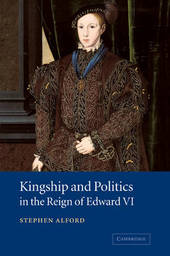
|
Kingship and Politics in the Reign of Edward VI
Paperback / softback
Main Details
| Title |
Kingship and Politics in the Reign of Edward VI
|
| Authors and Contributors |
By (author) Stephen Alford
|
| Physical Properties |
| Format:Paperback / softback | | Pages:248 | | Dimensions(mm): Height 226,Width 152 |
|
| Category/Genre | British and Irish History
World history - c 1500 to c 1750 |
|---|
| ISBN/Barcode |
9780521039710
|
| Classifications | Dewey:942.053 942.053 |
|---|
| Audience | | Professional & Vocational | | General | | Tertiary Education (US: College) | |
|---|
| Illustrations |
6 Halftones, unspecified
|
|
Publishing Details |
| Publisher |
Cambridge University Press
|
| Imprint |
Cambridge University Press
|
| Publication Date |
16 August 2007 |
| Publication Country |
United Kingdom
|
Description
This book offers a reappraisal of the kingship and politics of the reign of Edward VI, the third Tudor king of England who reigned from the age of nine in 1547 until his death in 1553. The reign has often been interpreted as a period of political instability, mainly because of Edward's age, but this account challenges the view that the king's minority was a time of political faction. It shows how Edward was shaped and educated from the start for adult kingship, and how Edwardian politics evolved to accommodate a maturing and able young king. The book also explores the political values of the men around the king, and tries to reconstruct the relationships of family and association that bound together the governing elite in the king's Council, his court, and in the universities. It also assesses the impact of Edward's reign on Elizabethan politics.
Reviews'... essential reading ... It is bold, even radical, in its determination not to be distracted by conventional narratives of politics, and it explains extremely well how previous narratives have been constructed and why they don't work. At the same time the book is sensitive to its competitors, and is skilfully positioned in the space between Diarmaid MacCulloch's Tudor Church Militant and Jennifer Loach's Edward VI.' John Guy, University of St Andrews 'Dr Alford has given us some fascinating ... insights into this period.' Contemporary Review
|